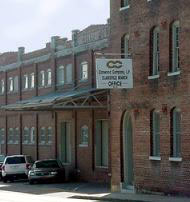TENNESSEE SPOTLIGHT
 |
 |
| The Conwood Co. in Clarksville is spending $6.5 million on expanding and renovating its tobacco production facilities. Conwood is one of the oldest companies in town. |
Work Force Preparation
For Tennessee to continue to secure high-wage manufacturing
jobs in the future, some experts say it will require a tighter focus
on work force preparation.
Sharon Younger, a Jackson, Tenn.-based consultant who frequently advises economic development agencies, says that "the top challenge for Tennessee is preparing the work force of the future. You can't build a lot of these products [coming out of advanced manufacturing centers] on an assembly line. The job requires a lot of technical training. The new raw material is the work force."
McCallum notes that Tennessee is sometimes unfairly penalized with the perception that it is losing manufacturing jobs to offshore locations because it has inferior labor quality. This is not true, he said. Rather, this trend is more indicative of the global supply-chain movement and the search for cheap labor.
Younger is optimistic that, if Tennessee can redouble its efforts on work force training, it can succeed in attracting the high-paying industries of the future — namely, biotechnology and alternative fuels.
"All of the right infrastructure is in place in Memphis for that region to have a very successful biotech economy," she says. "Memphis has tremendous knowledge resources and research capabilities. It reminds me of the early 1980s when the business leadership of Memphis came together and decided to bill Memphis
as the distribution hub of North America. It really paid off, and it
can happen again."
Memphis
as the distribution hub of North America. It really paid off, and it
can happen again."
A study by Kiplinger's Personal Finance evaluated tax rates at 101 U.S. cities and found that Memphis has the fourth-lowest rate for state and local taxes in the nation.
Medical manufacturing is also emerging as a force in the state, highlighted by DuPont's new $130-million plant in Old Hickory. The factory will make a new line of medical fabrics called Suprel, used in operating room and patient drapes.
The alternative fuels industry will be attracted to East Tennessee, Younger says, because this region stands "at the crossroads" of new automotive plant investment, with the National Transportation Research Center (NTRC) in Oak Ridge and the Electrical Vehicle Institute (EVI) in Chattanooga.
"The NTRC in Oak Ridge can be a tremendous resource and partner," she says. "EVI has provided Knoxville with the technology to have an all-electric bus fleet. The University of Tennessee's main campus in Knoxville has additional transportation research capabilities and assets. Plus, you have the traditional automotive manufacturing assets throughout the state."
In other words, it may be time for traditional industries in Tennessee to look homeward in order to prepare for the jobs of tomorrow.
Sharon Younger, a Jackson, Tenn.-based consultant who frequently advises economic development agencies, says that "the top challenge for Tennessee is preparing the work force of the future. You can't build a lot of these products [coming out of advanced manufacturing centers] on an assembly line. The job requires a lot of technical training. The new raw material is the work force."
McCallum notes that Tennessee is sometimes unfairly penalized with the perception that it is losing manufacturing jobs to offshore locations because it has inferior labor quality. This is not true, he said. Rather, this trend is more indicative of the global supply-chain movement and the search for cheap labor.
Younger is optimistic that, if Tennessee can redouble its efforts on work force training, it can succeed in attracting the high-paying industries of the future — namely, biotechnology and alternative fuels.
"All of the right infrastructure is in place in Memphis for that region to have a very successful biotech economy," she says. "Memphis has tremendous knowledge resources and research capabilities. It reminds me of the early 1980s when the business leadership of Memphis came together and decided to bill
 Memphis
as the distribution hub of North America. It really paid off, and it
can happen again."
Memphis
as the distribution hub of North America. It really paid off, and it
can happen again." A study by Kiplinger's Personal Finance evaluated tax rates at 101 U.S. cities and found that Memphis has the fourth-lowest rate for state and local taxes in the nation.
Medical manufacturing is also emerging as a force in the state, highlighted by DuPont's new $130-million plant in Old Hickory. The factory will make a new line of medical fabrics called Suprel, used in operating room and patient drapes.
The alternative fuels industry will be attracted to East Tennessee, Younger says, because this region stands "at the crossroads" of new automotive plant investment, with the National Transportation Research Center (NTRC) in Oak Ridge and the Electrical Vehicle Institute (EVI) in Chattanooga.
"The NTRC in Oak Ridge can be a tremendous resource and partner," she says. "EVI has provided Knoxville with the technology to have an all-electric bus fleet. The University of Tennessee's main campus in Knoxville has additional transportation research capabilities and assets. Plus, you have the traditional automotive manufacturing assets throughout the state."
In other words, it may be time for traditional industries in Tennessee to look homeward in order to prepare for the jobs of tomorrow.


